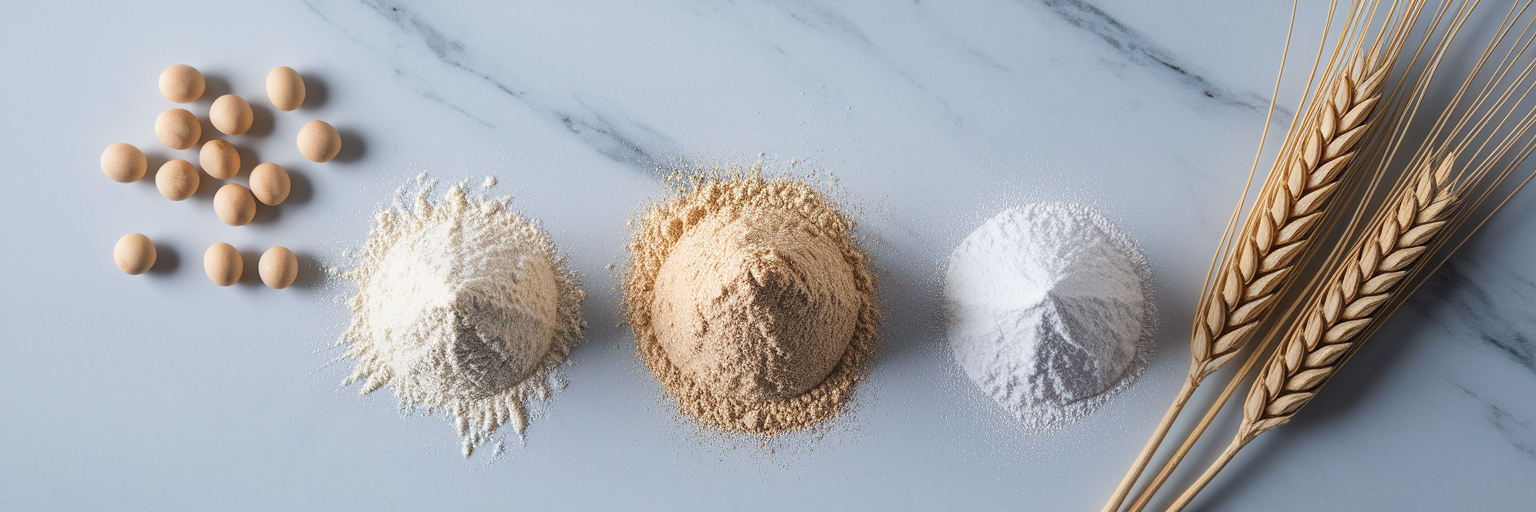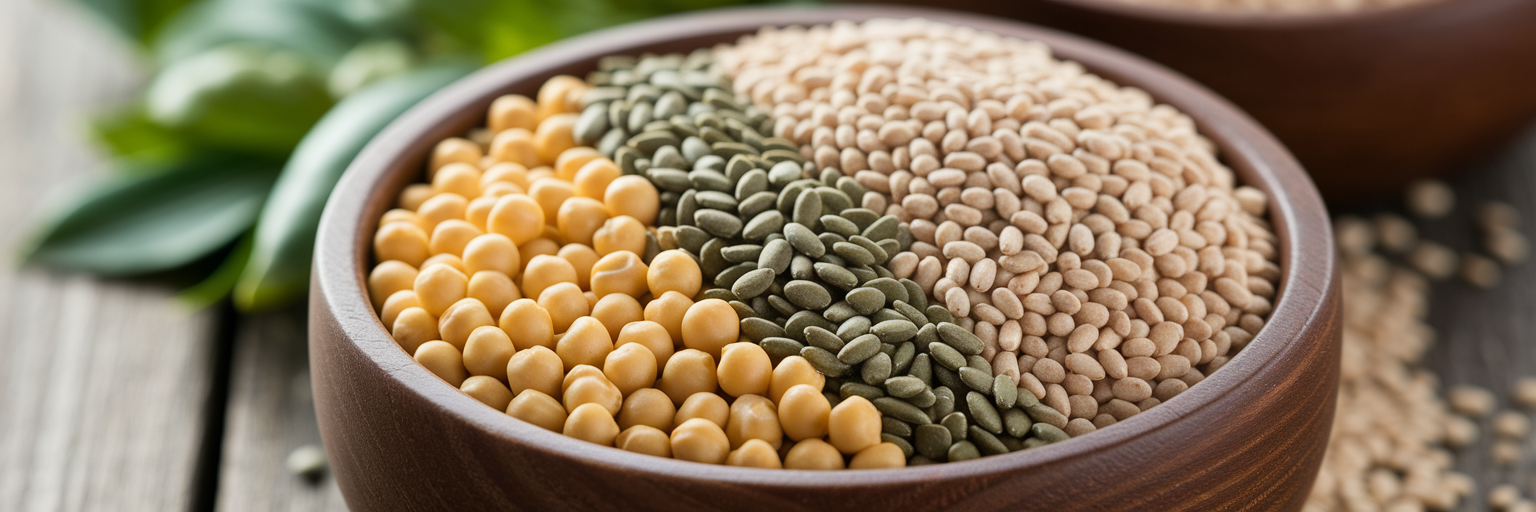If you're an athlete with food sensitivities, the search for the right protein powder can feel like a frustrating chore. You scan endless ingredient lists, trying to dodge potential triggers while still getting the fuel you need for performance and recovery. We get it, and you're definitely not alone in this.
Think of this article as your simple, supportive guide to navigating the options. The good news is that finding a great protein powder is much easier when you know what to look for. Vegan protein is a fantastic choice for many athletes, offering powerful benefits without the common allergens found in whey or casein.
Our goal is to help you confidently find a clean plant based protein powder that works for your body, so you can focus on your training, not on an upset stomach. Let's get you fueled up without the worry.
Common Triggers Hiding in Protein Powders
Before you can find the right fit, it helps to know what to avoid. Many protein powders, even plant-based ones, contain common irritants that can cause bloating, inflammation, or digestive distress. Becoming a "label detective" is your first step toward finding the best protein for food allergies and sensitivities.
The Usual Suspects: Soy and Gluten
Soy and gluten are two of the most common culprits. While they are plant-derived, they are also well-known allergens. Soy can cause bloating for some people, while gluten can trigger inflammation and digestive issues in those with celiac disease or sensitivity. A quality soy free gluten free protein is often the safest starting point for athletes with known sensitivities.
Hidden Culprits: Additives and Fillers
Have you ever looked at an ingredient list and wondered what all those long, chemical-sounding names are? Many powders use artificial sweeteners like sucralose and aspartame for taste, but these can cause significant gut distress. Gums and fillers like xanthan gum or carrageenan are added for a thicker texture, but they can also lead to uncomfortable bloating and gas for many people.
The Cross-Contamination Factor
This is a big one, especially for those with severe allergies. Cross-contamination happens when a product is made in a facility that also processes major allergens like nuts, soy, or dairy. Even if the powder itself is free from these ingredients, tiny traces can make their way into the final product. That's why certifications are so important.
| Ingredient/Issue | Potential Problem for Sensitive Athletes | What to Look for on the Label |
|---|---|---|
| Soy | Common allergen, can cause bloating and hormonal concerns for some. | 'Contains: Soy' warning, soy protein isolate/concentrate. |
| Gluten | Triggers celiac disease and gluten sensitivity, causing inflammation. | Wheat, barley, or rye ingredients; look for 'Certified Gluten-Free'. |
| Artificial Sweeteners (e.g., Sucralose) | Can cause digestive distress, gas, and bloating. | Sucralose, aspartame, acesulfame potassium in the ingredient list. |
| Gums & Fillers (e.g., Xanthan Gum) | Used for texture but can lead to gut discomfort for many. | Xanthan gum, carrageenan, guar gum. |
Decoding Labels for Allergen Safety

Now that you know what to watch out for, let's talk about how to spot it. Reading a label shouldn't require a dictionary. A great rule of thumb is this: if the ingredient list is short and you can pronounce everything, you're on the right track. Here’s how to break down the process of finding truly allergen free protein supplements.
- Scan for a short ingredient list. The best protein powders don't need a long list of fillers, gums, and artificial flavors. They rely on high-quality, simple ingredients. Fewer ingredients mean fewer opportunities for a reaction.
- Look for third-party certifications. These are your proof of safety. A "Certified Gluten-Free" seal means the product has been tested to meet strict standards. An "NSF Certified for Sport" logo indicates it's been tested for banned substances and label accuracy. According to Healthline, these certifications are crucial for verifying that a product is free from top allergens and safe for athletes.
- Check for allergen warnings. Pay close attention to phrases like "made in a facility that also processes tree nuts, soy, and dairy." For someone with a severe allergy, this warning is a dealbreaker, as the risk of cross-contamination is too high. A truly safe product will be made in a dedicated allergen-free facility.
Why not practice right now? Grab your current protein powder and read the label using these tips. If you have more questions about what certain terms mean, the FAQs page on a brand's website can be a great resource for clear answers.
The Best Hypoallergenic Plant Protein Sources
Let's shift from what to avoid to what you can confidently enjoy. For athletes with sensitivities, single-source proteins are often the safest and most effective choice. A hypoallergenic vegan protein powder built on one of these core ingredients minimizes the risk of a reaction while delivering the amino acids you need for muscle repair and growth.
Here are some of the top choices that are gentle on the digestive system:
- Pea Protein: This is a powerhouse for athletes. It's naturally hypoallergenic, easy to digest, and packed with branched-chain amino acids (BCAAs) like leucine, which is essential for muscle recovery.
- Brown Rice Protein: Another excellent, gentle option. Brown rice protein is known for being very easy on the stomach and provides a great amino acid profile that complements pea protein perfectly.
- Hemp & Pumpkin Seed Protein: These are fantastic emerging options. Hemp protein offers the added benefit of omega-3 and omega-6 fatty acids, while pumpkin seed protein is a great source of minerals like magnesium and zinc, which support recovery and immune function.
Choosing a powder based on these ingredients dramatically reduces your chances of digestive trouble. Once you find a protein source you love, you can get creative with it in the kitchen. There are tons of simple recipes that can make your daily protein shake something to look forward to.
Top Features of a Sensitivity-Friendly Protein Powder

Feeling more confident? Let's tie it all together with a final checklist. When you're trying to figure out how to choose vegan protein, look for a product that ticks these four boxes. This is your blueprint for finding a powder that will support your performance without causing any setbacks.
- A Hypoallergenic Source: The base of the powder should be pea, brown rice, hemp, or another single-source protein known to be gentle on the gut.
- Third-Party Tested: Look for certifications like Certified Gluten-Free or NSF Certified for Sport. This is non-negotiable for safety and purity.
- No Artificial Junk: The ingredient list should be free from artificial sweeteners, colors, flavors, and unnecessary gums or fillers. Natural sweeteners like monk fruit or stevia are better alternatives.
- A Transparent Ingredient List: The brand should be proud to show you exactly what's inside. Short, simple, and understandable is the goal.
A growing number of high-quality powders also include gut-friendly additions like probiotics and digestive enzymes. These ingredients can offer extra support for sensitive stomachs by helping your body break down and absorb the protein more efficiently. A great next step is to explore some of the best protein powders that follow these principles to see what a clean label looks like in the wild.
Making Your New Protein Work for You
Once you've found a powder that meets the criteria, it's time to introduce it to your routine. The key is to start slow and listen to your body. Don't jump straight into a full serving on a heavy training day.
Instead, give your new protein a "test drive." Start with just a half-scoop mixed with water or a simple, non-dairy milk like oat or almond milk. This helps you isolate the protein and see how your body responds without any other variables. If all goes well after a day or two, you can move up to a full scoop.
Remember, you are the expert on your own body. Finding the perfect protein match is a personal process, but with these tools, you are now fully equipped to make an informed and confident choice. You've got this!
For more tips on fueling your active lifestyle, check out other articles on our blog. And if you found this guide helpful, please share it with a friend or teammate who might be on the same journey!



